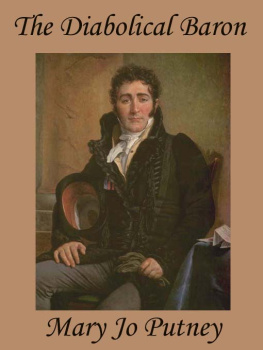Mary Putney - Dancing on the Wind
Here you can read online Mary Putney - Dancing on the Wind full text of the book (entire story) in english for free. Download pdf and epub, get meaning, cover and reviews about this ebook. genre: Romance novel. Description of the work, (preface) as well as reviews are available. Best literature library LitArk.com created for fans of good reading and offers a wide selection of genres:
Romance novel
Science fiction
Adventure
Detective
Science
History
Home and family
Prose
Art
Politics
Computer
Non-fiction
Religion
Business
Children
Humor
Choose a favorite category and find really read worthwhile books. Enjoy immersion in the world of imagination, feel the emotions of the characters or learn something new for yourself, make an fascinating discovery.

- Book:Dancing on the Wind
- Author:
- Genre:
- Rating:5 / 5
- Favourites:Add to favourites
- Your mark:
- 100
- 1
- 2
- 3
- 4
- 5
Dancing on the Wind: summary, description and annotation
We offer to read an annotation, description, summary or preface (depends on what the author of the book "Dancing on the Wind" wrote himself). If you haven't found the necessary information about the book — write in the comments, we will try to find it.
Dancing on the Wind — read online for free the complete book (whole text) full work
Below is the text of the book, divided by pages. System saving the place of the last page read, allows you to conveniently read the book "Dancing on the Wind" online for free, without having to search again every time where you left off. Put a bookmark, and you can go to the page where you finished reading at any time.
Font size:
Interval:
Bookmark:
Mary Jo Putney
Dancing on the Wind
To my widely scattered writing buddies, for comfort, laughter, and commiseration. You know who you are.
Prologue
Eton, Winter 1794
After the funerals he was sent back to school. What else could be done with a boy, even one who had just become the wealthiest child in Great Britain?
The brand-new Earl of Strathmore, Lucien Fairchild, was desperately anxious to return to Eton. There, with his friends, he could try to pretend that nothing had changed; that when he went back to Ashdown at the end of the term, he would find his father and mother and sister still alive and well.
He knew better, of course, but he was not yet ready to accept the finality of death. Perhaps when he turned twelve, it would be easier.
His former title had been Viscount Maldon. The Eton headmaster who greeted his carriage was quick to call him Strathmore, as were the school servants who took charge of his baggage, but behind his back, twice he heard voices murmur, "The orphan earl." Lucien cringed when he heard the phrase. It sounded unbearably pathetic. He resented his cane for the same reason, but at least that would be gone in a few weeks.
It was midevening when he arrived at the boarding house where he was lodged. As soon as he had shed his coat and gloves in his room, he went in search of his particular friends, all of whom lived in the same house. As usual, they had gathered in Rafe's chamber, which was the largest and the warmest.
Lucien limped into the room without bothering to knock. His three friends were sprawled in various positions across the furniture. Nicholas was a viscount, Rafe a marquess, and Michael the younger son of a duke, but those titles were mere courtesy, while Lucien was now a peer of the realm. He wished to God that it wasn't so.
When the door swung open, they all looked up. There was a moment of ghastly silence. They had heard the news, of course.
Lucien's heart sank. Brittle with grief and a primal loneliness that he knew would be with him for the rest of his life, he needed desperately for his friends to be the same. He didn't think he would be able to bear it if they were too embarrassed to treat him as they always had.
Then Nicholas set aside his book and uncoiled from his spot in front of the fire. His Gypsy blood made him more demonstrative than the others, and it was entirely natural for him to drape an arm around Lucien's shoulders and guide him to the fire. "Glad you're back," he said easily. "You're just in time for toasted cheese."
Lucien was deeply grateful for his friend's casual gesture. It made him feel real again. In the last fortnight he had sometimes wondered if he was as much a ghost as his family.
As he folded down onto the rug in front of the fire, the other boys set their books aside. Then they toasted chunks of cheese on long forks. The oozing, savory results were smeared across slabs of bread, a perfect supper for a cold, damp night.
Conversation was casual, mostly school news that had taken place in Lucien's absence. It wasn't necessary for him to talk at all, which was fortunate, because he wasn't sure if he would have been able to speak past the lump in his throat. In time, as the tight knot in his chest began to ease, he was able to contribute an occasional comment. He also found, with mild wonder, that he was hungry for the first time since the accident.
When the cheese was gone, Rafe said, "I found something in town that I thought you might like for your collection, Luce." He got up and rooted around in his desk, then came back and handed over a small object.
It was a windup mechanical tortoise with a miniature bronze mermaid perched on top of the shell. Even his corrosive grief could not prevent Lucien from being intrigued. "It's a real turtle shell, isn't it?" He turned the device over in his hands, studying the fine workmanship, then wound the spring and set it on the floor.
Ponderously the turtle lurched forward. Though it rolled on tiny hidden wheels, the head and legs moved as if it really walked. On its back, the coy mermaid waved her arm back and forth, throwing flirtatious kisses to the watching boys.
Lucien smiled for a moment before reality crashed down on him again. It was his father who had given him his first mechanical toy, and encouraged him to collect and build them. His father, who now lay in the family crypt at Ashdown, his laughter forever silent. Lucien blinked back the tears that threatened to spill from his eyes. If only there really was a fairy land of mermaids and magic where no one ever died.
When he had mastered himself, he said, "Are you sure you want to give this away, Rafe? I've never seen one like it."
Rafe shrugged. "Any time I want to see it, I'll know where to go."
The turtle ground to a stop, so Lucien wound the spring and set it off again. Finally able to make an oblique reference to what had happened, he said in a low voice, "They're calling me the Orphan Earl."
There was a revolted silence before Michael said, "A beastly nickname. Makes you sound like a beggar boy."
The others nodded agreement. Lucien had known that they would understand.
"We need to find a better nickname before that one sticks," Rafe said firmly. "Luce, how would you like to be known?"
Nicholas chuckled. "How about the Serpent of Strathmore? That sounds properly dangerous."
Lucien considered. A serpent, sleek and deadly. Everyone feared serpents. Still "Not bad, but not quite right."
"I've got a better idea." Michael grinned and held up the book he had been studying. It was Milton's Paradise Lost. "Since your name is Lucien, Lucifer is a natural choice."
"Perfect," Nicholas said enthusiastically. "Lucifer, the rebellious archangel who would rather reign in hell than serve in heaven. Blond as you are, you'd make a good morning star."
"A dashing name," Rafe agreed. "Personally, I think Milton had a secret fondness for Lucifer. As a character he's far more interesting than God, who acts like a bullying headmaster."
"If we all start referring to you as Lucifer, in a fortnight every boy at Eton will be doing the same." Michael's green eyes sparked with mischief. "The masters will say it's sacrilegious. They'll be furious."
Lucien leaned back against the bed and closed his eyes as he considered. Nicknames were important; being called something stupid like Weezy at Eton could follow a man all his life. Lucifer was a good strong name-a being that could laugh at God would know better than to love too much. And surely a proud, dangerous fallen archangel would not weep at night.
He tried on a cool, ironic expression. Yes, this would do very well. "All right," he said slowly. "I'll be Lucifer."
Chapter 1
London, October 1814
Two days had passed, and the time for weeping was over. Now it was time for action.
She had already asked the obvious questions of the appropriate people, and come up empty-handed. There was no evidence beyond her intuition that something dreadful had happened.
Of course, in this instance her intuition was infallible.
At least, thank God, the worst had not yet occurred. If she acted quickly, she might be able to prevent the ultimate disaster. But what could be done? There were no conventional sources of aid in such a situation, and while there were men whom she might ask for help, there were none she dared trust.
She forced herself to stop her frantic pacing around the disordered room, which showed the effects of her futile searching. She was supposed to be a clever woman, so it was time she acted like one.
Seating herself at the desk, she cut a precise point on a quill pen, dipped it into the inkstand, and began to jot down what she knew. First came dates, times, and the answers of those people she had questioned. Then she wrote out her theory of what must have happened. It was supported mostly by half-remembered conversations, but it fit the facts, so she would proceed as if it were true. After all, she had no other theories.
Font size:
Interval:
Bookmark:
Similar books «Dancing on the Wind»
Look at similar books to Dancing on the Wind. We have selected literature similar in name and meaning in the hope of providing readers with more options to find new, interesting, not yet read works.
Discussion, reviews of the book Dancing on the Wind and just readers' own opinions. Leave your comments, write what you think about the work, its meaning or the main characters. Specify what exactly you liked and what you didn't like, and why you think so.





